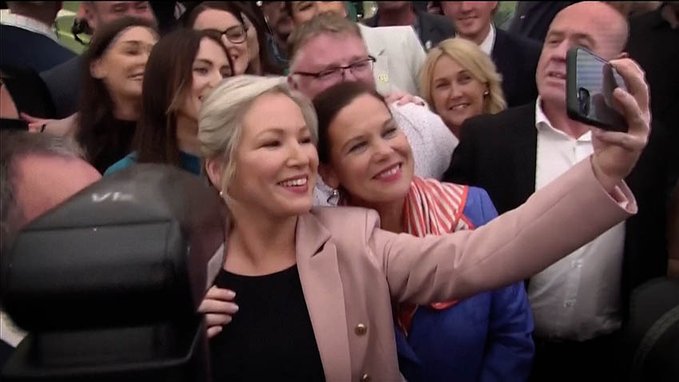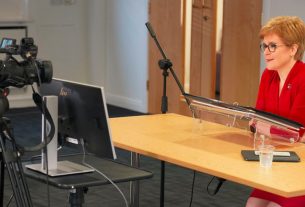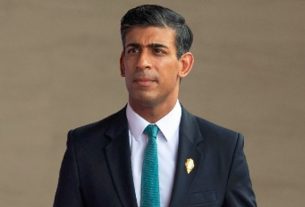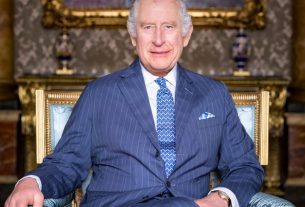Sinn Fein has scored a historic result in the Northern Ireland election. For the first time in Northern Ireland, a nationalist party has won the biggest number of seats, as it comfortably overtook the DUP to become the biggest party. The Alliance Party also performed very well, while both the UUP and the SDLP suffered losses.
On Monday, Sinn Fein and the Alliance Party are likely to be at Stormont. It is unclear whether the DUP, which performed better than expected, will continue its stance on the Northern Ireland Protocol and block the reestablishment of the Northern Ireland Assembly. Although Northern Ireland Secretary, Brandon Lewis, has urged politicians to form an executive as soon as possible, the UK government is likely to dig its heels in when it comes to the Northern Ireland Protocol. Speaking on Sophie Ridge on Sunday, Dominic Raab said:
“It’s clear the Northern Ireland Protocol must be fixed… and that cannot be put off.
“We won’t get the executive that the people of Northern Ireland need until it is dealt with.”
DUP leader, Sir Jeffrey Donaldson told the BBC that he will reveal his intentions in the coming days:
“The party officers will sit down, we will consider what we need to do now to get the action that is required from the Government – I will be making my decision clear on all of that early next week”.
Northern Ireland election results usher in a new era
While Sinn Fein did not increase its number of seats from the 2017 election, the DUP lost three, the SDLP four, and the Ulster Unionist Party one seat. The biggest winners were the Alliance Party who jumped from eight seats at the last election to 17 this time around. Sinn Fein, however, triumphed when it comes to first preference votes with nearly 30 per cent. Here, the DUP suffered a considerable drop only getting a fraction over 21 per cent.
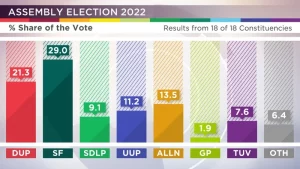
The party’s stance on the Northern Ireland Protocol must have been a factor, although following the results, party representatives were eager to point out that it had faired much better than anticipated.
Nevertheless, the fact that, for the first time ever, the nationalist community have more seats than the Unionists, is historic and changes the NI political landscape. The strong performance of the Alliance party is also an indication that the people of Northern Ireland back parties that want Stormont up and running.
Ironically, the two parties who were at the centre of the action in drawing up the Good Friday Agreement, continue losing out. Deputy leader of the SDLP, Nichola Mallon, lost her seat in North Belfast while UUP leader, Doug Beatty, scraped in on the seventh count.
Reacting to the Northern Ireland election results, Brandon Lewis said:
“The electorate delivered a number of messages on Thursday. They were clear that they want a fully functioning devolved government in Northern Ireland, they want the issues around the Protocol addressed, and that they want politics to work better.”
Brexit fallout continues
All eyes will be on Stormont now to see whether the DUP will be prepared to have Michelle O’Neill as First Minister and get the Stormont Assembly reestablished. Sir Jeffrey Donaldson pulled his party out of Stormont after the British government failed to scrap the Northern Ireland Protocol in spring.
The protocol continues to be a pill too bitter to swallow for many Unionists who feel it jeopardises Northern Ireland’s position within the United Kingdom. Boris Johnson had signed the legally binding agreement with the European Union to uphold the Good Friday Agreement and prevent the establishment of a hard border on the island of Ireland. Post-Brexit, this has meant a border in the Irish Sea which many Unionists vehemently dislike.
And some members of the UK government have also been voicing concern and threatening to unilaterally suspend it. Touching on that precisely, Dominic Raab told Sophie Ridge:
“If it (the NI protocol) had been implemented with… flexibility and goodwill and with the business interests of communities across Northern Ireland and it hadn’t been used frankly as a political device that it has, I don’t think we’d have the same level of problems.
“But the point of discussing that has passed. We must see it now fixed. The government is committed to fixing it.”
Mr Raab added that this could be done “preferably by negotiations”.
But the NI business community has already warned of the dire consequences of a potential trade war between the EU and Britain. With food prices already on the rise and people struggling with the rising cost of living, potential EU tariffs on British food exports could mean further price hikes.
Speaking to the Independent, trade policy adviser, Peter Hardwick of the British Meat Processors Association (BMPA)said:
“I fear that if the UK government takes unilateral action we will have a major problem because the EU can interpret that as the agreement being broken.”
“The EU might take legal action initially, but there could be some punitive measures. If we end up with tariffs being applied on goods then that would be horrific. It will push up costs and prices.”
But the UK government is reported to have drafted legislation to get rid of checks on goods moving from Britain to Northern Ireland though Boris Johnson is not expected to include it in the Queen’s speech next week.

